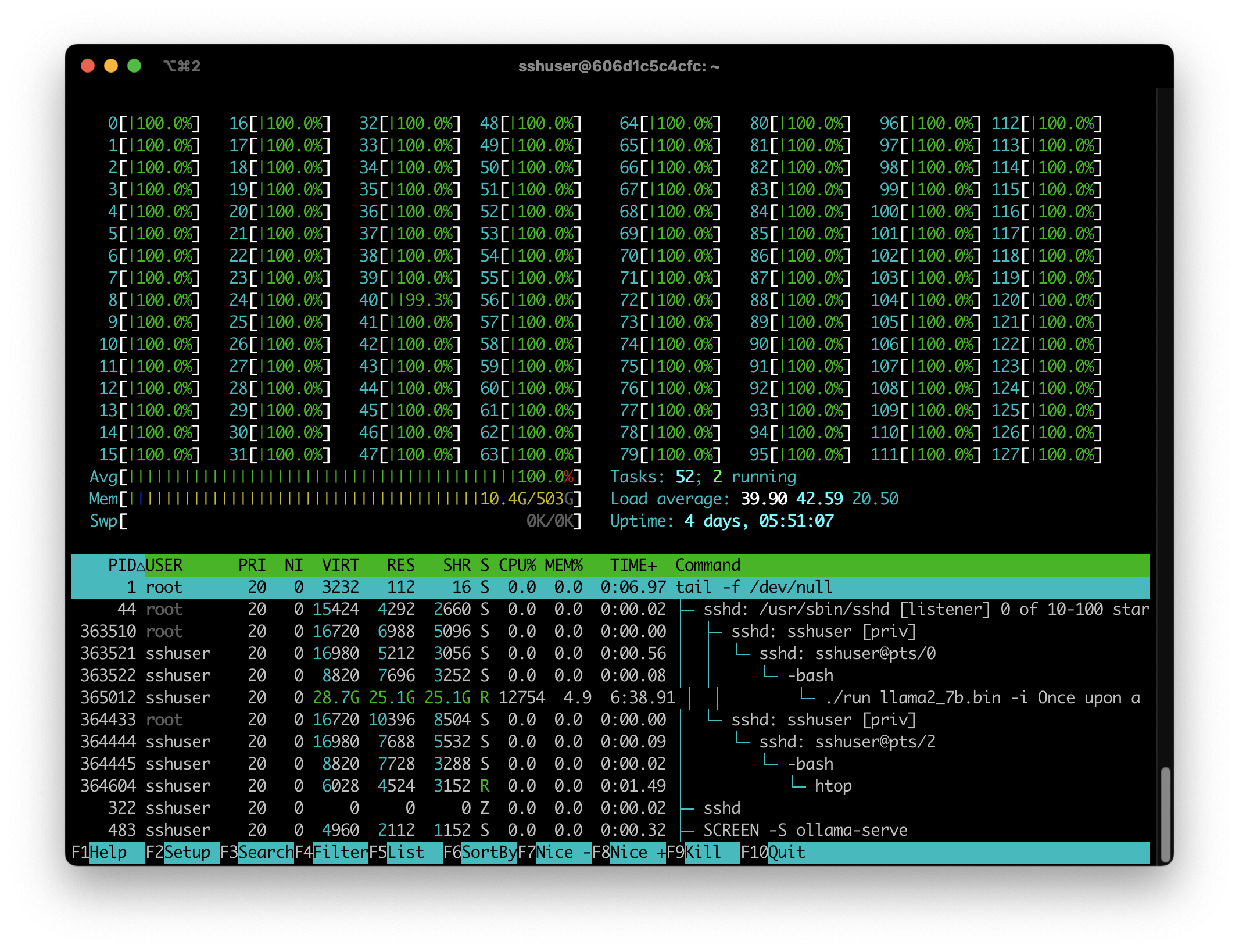
llama2.c
실행
M1 Pro:
$ ./run stories15M.bin -t 0
Once upon a time, there was a little girl named Lily.
...
achieved tok/s: 112.314709
DGX Station A100:
achieved tok/s: 72.649573
128개 코어 중 하나만 사용하며 M1에 비해 늦다.
Quantization
quantized model은 DGX에서 multithreads로 실행할 때 3x ↑
matmul() 함수를 비교하면 다음과 같다.
// run.c
void matmul(float* xout, float* x, float* w, int n, int d) {
// W (d,n) @ x (n,) -> xout (d,)
for (i = 0; i < d; i++) {
float val = 0.0f;
for (int j = 0; j < n; j++) {
val += w[i * n + j] * x[j];
}
xout[i] = val;
}
}
// runq.c
void matmul(float* xout, QuantizedTensor *x, QuantizedTensor *w, int n, int d) {
// W (d,n) @ x (n,) -> xout (d,)
for (i = 0; i < d; i++) {
float val = 0.0f;
int32_t ival = 0;
int in = i * n;
for (int j = 0; j <= n - GS; j += GS) {
for (int k = 0; k < GS; k++) {
ival += ((int32_t) x->q[j + k]) * ((int32_t) w->q[in + j + k]);
}
val += ((float) ival) * w->s[(in + j) / GS] * x->s[j / GS];
ival = 0;
}
xout[i] = val;
}
}
run.c는 float 곱셈 결과를 모두 더하는 naive 구현이고, runq.c는 GS 크기(여기서는 group_size=64)만큼 점프하면서 int8을 int32로 변환한 곱셈 결과에 scale을 곱한 값을 더해나간다. runq.c의 연산이 더 많지만 naive float 곱셈보다 임베딩 값인 x도 quantized value인 int32 곱셈이 더 빠르다. 참고로 PyTorch doesn’t allow INT8 matrix multiplication by default.
DGX 실행 결과:
$ OMP_NUM_THREADS=16 ./runq llama2_7b_q80.bin -i "Once upon a time" -n 10 -t 0.0
float연산: 9.336100 tokens/sint32연산: 11.658031 tokens/s
OpenMP
$ make runomp로 DGX에서 openmp로 128코어를 모두 사용할 수 있다.

M1:
# brew install llvm libomp
# echo 'export PATH="/opt/homebrew/opt/llvm/bin:$PATH"' >> ~/.zshrc
# CC = clang # Makefile
# make runomp
# clang -Ofast -fopenmp -march=native runq.c -lm -o runq
$ OMP_NUM_THREADS=10 ./runq llama2_7b_q80.bin -i "Once upon a time" -n 10 -t 0.0
실행 속도 정리
llama2-7b.bin
llama2-7b FP32(25G) / Q8(6.7G), DGX: gcc 11.4.0, M1: clang 17.0.6
$ ./run llama2_7b.bin -i "Once upon a time" -n 10 -t 0.0
| machine | build | run | quantized | tokens/s |
|---|---|---|---|---|
| DGX | make | 0.163970 | ||
| make runfast | 0.479004 | |||
| make runomp | OMP_NUM_THREADS=1 | 0.675068 | ||
| make runomp | OMP_NUM_THREADS=64 | 4.782147 | ||
| make runomp | OMP_NUM_THREADS=128 | 4.668050 | ||
| make | o | 0.763294 | ||
| make runfast | o | 0.741229 | ||
| make runomp | OMP_NUM_THREADS=1 | o | 0.787195 | |
| make runomp | OMP_NUM_THREADS=64 | o | 14.446228 | |
| make runomp | OMP_NUM_THREADS=128 | o | 13.975155 | |
| M1 / 16G | make | 0.017468 | ||
| make runfast | 0.017962 | |||
| make runomp | OMP_NUM_THREADS=1 | 0.018126 | ||
| make runomp | OMP_NUM_THREADS=10 | 0.044429 | ||
| make | o | 2.241594 | ||
| make runfast | o | 2.380323 | ||
| make runomp | OMP_NUM_THREADS=1 | o | 2.357873 | |
| make runomp | OMP_NUM_THREADS=10 | o | 8.620690 |
M1에서 매우 느린 이유는 모델이 메모리에 전부 올라가지 않아서로 추정된다. Llama 2와 일치하는 더 작은 모델을 구할 수가 없다.
stories110M.bin
Karpathy가 미리 빌드한 별도의 작은 모델로 속도만 따로 측정:
$ ./run stories110M.bin -i "Once upon a time" -n 10 -t 0.0
| machine | build | run | tokens/s |
|---|---|---|---|
| DGX | make | 10.089686 | |
| make runfast | 28.938907 | ||
| make runomp | OMP_NUM_THREADS=1 | 38.961039 | |
| make runomp | OMP_NUM_THREADS=64 | 204.545455 | |
| make runomp | OMP_NUM_THREADS=128 | 145.161290 | |
| M1 / 16G | make | 11.335013 | |
| make runfast | 90.909091 | ||
| make runomp | OMP_NUM_THREADS=1 | 90.909091 | |
| make runomp | OMP_NUM_THREADS=10 | 118.421053 |
CUDA
$ ./runcuda stories110M.bin -i "Once upon a time" -n 128 -t 0
| machine | build | run | tokens/s |
|---|---|---|---|
| DGX | make runomp | OMP_NUM_THREADS=1 | 32.160041 |
| make runomp | OMP_NUM_THREADS=64 | 200.949367 | |
| make runomp | OMP_NUM_THREADS=128 | 145.642202 | |
| CUDA1 | nvcc llama2.cu -o runcu |
522.205207 | |
| CUDA2 / naive | make runcuda | 604.761905 | |
| CUDA2 / cuBLAS | make runcuda | 774.390244 |
naive 구현에서 sum을 float이 아닌 half로 output[index]에 할당하면 cuBLAS와 거의 근사할 정도로 빠르다. half는 CUDA에서 지원하는 fp16이다. 당연히 float과 결과가 약간 다르다. 128토큰에서 마지막 4~5토큰 정도가 다르게 생성됐다.
make runomp는 CPU로 실행됐을 것이며 naive 구현은 자료형을 half로 바꾼 정도의 차이만 있었을 것이다. (Jun 2024)
M1에서 clang 빌드
$ clang --version
Homebrew clang version 17.0.6
Target: arm64-apple-darwin23.3.0
Thread model: posix
InstalledDir: /opt/homebrew/opt/llvm/bin
$ /usr/bin/gcc --version
Apple clang version 14.0.3 (clang-1403.0.22.14.1)
Target: arm64-apple-darwin23.3.0
Thread model: posix
InstalledDir: /Applications/Xcode.app/Contents/Developer/Toolchains/XcodeDefault.xctoolchain/usr/bin
convert.py
hf 모델은 convert가 되지 않았다.
$ python export.py llama2_7b_hf.bin --version 0 --hf /Users/xxx/workspace/llama-2/Llama-2-7b-hf
[1] 88371 killed python export.py llama2_7b_hf.bin --version 0 --hf
/opt/homebrew/anaconda3/envs/python310/lib/python3.10/multiprocessing/resource_tracker.py:224: UserWarning: resource_tracker: There appear to be 1 leaked semaphore objects to clean up at shutdown
warnings.warn('resource_tracker: There appear to be %d '
또한 --version 1로 변환시 실행이 되지 않는다.
$ ./run llama2_7b_hf.bin -i "Once upon a time" -n 10
[1] 93242 segmentation fault ./run llama2_7b_hf.bin -i "Once upon a time" -n 10
스크립트3를 이용해 pth로 변환하고 --version 0으로 진행. quantized는 2로 진행했다.
Last Modified: 2024/06/03 13:20:59
